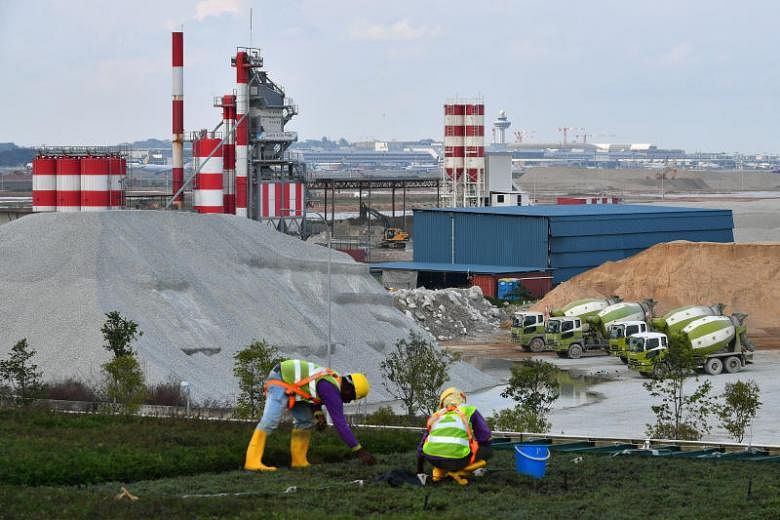Fees and charges for travellers flying out of Changi Airport and airlines operating there could increase from as early as next year.
This is to help pay for the future Terminal 5 (T5), which is slated for completion around 2030, The Sunday Times understands.
The total cost of the Changi East development being built near the current airport, which includes major infrastructure and ground works, is expected to run into tens of billions of dollars.
The future terminal is expected to eventually handle up to 70 million passengers a year. With T5, Changi Airport will have almost doubled in size to cover more than 2,000ha, with room for up to 150 million passengers a year.
The Changi East project - as the development is referred to - is the most ambitious attempt to cement Singapore's status as a key aviation hub since Changi Airport opened in 1981.
Asked to confirm if users will have to pay for T5 before it opens, a spokesman for the Transport Ministry said: "We have not ruled out implementing a passenger fee."
The total fee for travellers flying from Changi Airport, made up of components such as a security tax, is currently $34. This was last increased in April 2013, from $28. Transit passengers pay $6.
Given the strategic importance of the Changi air hub, the Government will bear "a large proportion" of total costs for the Changi East project, said the spokesman.
Prime Minister Lee Hsien Loong had earlier this month announced that taxes will be increased as government spending on investments and social services grows. But he did not say when taxes will be raised.
The rest of the Changi East bill will be shared by Changi Airport Group (CAG) - a corporate entity which operates the airport - and other aviation stakeholders, the Transport Ministry said.
The Government has sought industry feedback and is studying various joint contribution options, the spokesman added.
Other airports have recently introduced similar user charges. Since last year, Hong Kong International Airport, which is building a third runway, has been collecting between HK$70 and HK$180 (S$12 and S$31) a traveller, depending on the class of travel and flight duration. Seven in 10 passengers can expect to pay HK$90 or less, a spokesman told The Sunday Times, adding that the fee has not affected the airport's competitiveness.
The airports in Dubai, United Arab Emirates and Doha, Qatar, have ongoing expansion projects and last year introduced a departure tax for travellers which is the equivalent of S$13.
CAG chief executive Lee Seow Hiang said: "We're confident of the need for T5, but it's so big, everyone has to chip in. We're also putting our money where our mouth is, which is why a huge part of our profits and future profits will be ploughed back into the Changi East development."
For the financial year ending in March this year, CAG's profit after tax was nearly $660 million .
Asked if the higher charges could affect Changi's competitiveness, Mr Lee said: "It would be silly for us to overdo this... If the airlines cannot succeed with us, what is the point of raising the capacity?"
Singapore Management University Associate Professor Terence Fan, who specialises in transport, said it is fair that potential beneficiaries help pay for the T5 development.
This includes airlines and travellers who may not end up using the facility but will benefit indirectly, if other terminals are less crowded and more comfortable.
Mr Abbas Ismail, course manager for the diploma in aviation management and services at Temasek Polytechnic, said options must be carefully evaluated. "Changi has always taken the approach to be pro-business and competitive by keeping its aeronautical charges (such as aircraft parking and landing fees) low and even providing the necessary incentives to support traffic growth.
"By getting users to start paying for T5 even before the terminal opens, airport planners must think carefully about what signal it will send to the industry," he said.
SEE INSIGHT


